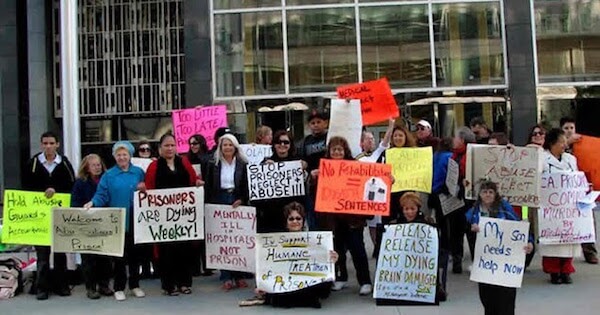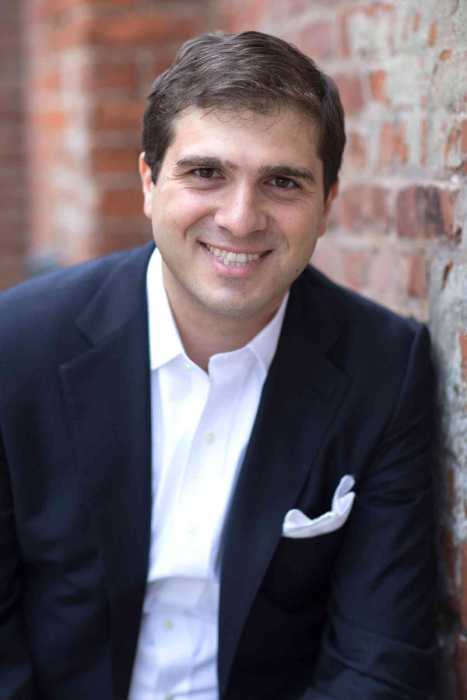Demonstrators in Albany on January 18 of this year called for state prison parole reforms.
Did you hear Trump call undocumented immigrants animals? It’s stirring up — rightly — a lot of concern. Among humans, “animal” is the essential, go-to word to deprive people of their humanity. It’s the permission some people give themselves to ridicule, enslave, and commit genocide against other people. “Animal” is a term we read as a danger signal, even in a society such as ours, which was built on ridicule, enslavement, and genocide. And “animal” is often used by law enforcement to describe anyone accused of assaulting a police officer. Interesting how we’ve let this one go.
Over and over, my friend Herman Bell, who spent almost 45 years in New York State maximum-security prisons, has been called an animal. Herman was convicted in 1975 of killing two New York City police officers and sentenced to 25-to-life — meaning that, after 25 years, he was eligible for parole. Thanks to his accomplishments and compassion over the years; thanks to advances in state parole regulations weighing who a person has become and not just the “nature of the original offense”; thanks to enormous love from family and friends, Herman was released in April, after his eighth appearance before the Parole Board.
PERSPECTIVE: Snide Lines
But this column isn’t about Herman. It’s instead about the institutions and the people who wanted him to die slowly over more decades in prison. As an animal.
When Herman’s parole decision came down last March, Patrick Lynch, president of the Patrolmen’s Benevolent Association (PBA), declared at a press conference, “We’re gonna get you, we don’t care why you’re behind bars… We just care that you are behind bars.” The PBA also issued a “safety alert” to NYPD officers: “In the event of Bell’s release, all PBA members are urged to remain vigilant, both on- and off-duty, to ensure their own safety and to provide back-up to any other law enforcement officers in their vicinity.”
The danger to public safety posed by Herman Bell out of prison roughly approximates the danger posed by 99.6 percent of undocumented immigrants inside US borders: NONE.
The real danger — which most of us are sleeping on — is the vigilante mentality that powers our law enforcement. Since way before Stonewall, cops have rounded up queers; they can still arrest and brutalize us at street protests. But queer communities don’t necessarily see how the cops also work alongside the prison system. So here’s another safety alert; this one’s about the police.
Be on the lookout for:
Use of Scathing Pejoratives: Words like “monster,” “vermin,” “blood-thirsty,” and, of course, “animal” used by police as synonyms for actual people accused or convicted of crimes. This degree of loathing is designed to authorize the deepest kind of lynch-mob contempt. These names are, in fact, used so often to describe people of color that you wonder if they’re simply society’s latest ploy to get away with saying “n*gg*r.”
Lurid Press Coverage: This is the aorta through which “law-and-order” pejoratives and vigilantism enter the public bloodstream. Mainstream media repeat — unquestioned and un-fact-checked — whatever police officials tell them. “Cold-blooded cop-killer” headlines boost ratings. Meanwhile, the press is too busy buying tough-on-crime accounts wholesale to ask journalism-101 questions, such as why a law officer such as Pat Lynch threatening, “We’re gonna get you, we don’t care why you’re behind bars” isn’t … well … illegal?
Copying down “cop-killer” denunciations, reporters seldom bother to question if adjectives like “cold-blooded” and “monster” are close to accurate. NYPD Commissioner James O’Neill, on hearing of Herman’s parole, wrote that Herman should remain in prison because, “His mind has not changed, his heart has not opened…” Mainstream news outlets never asked how James O’Neill knew this.
It’s inconsequential that O’Neill (also Lynch, Mayor Bill de Blasio, and any other official denouncing Herman’s parole) never met Herman Bell or evinced an interest in records describing how Herman’s changed over the years. This sidelining of journalistic curiosity in favor of garish headlines is the foundation of media and police collusion. Through it, we’re bullied out of wondering if “criminals” might actually be people a little like ourselves.
Backlash Against New Parole Board Regulations: In another press conference, Patrick Lynch lamented the “coup” at the State Parole Board, where “right-minded” commissioners were ousted and replaced by those with an agenda. Already, conservative state senators, who only noticed progressive regulation changes after Herman’s parole, have passed several bills overturning these advances.
Although the bills still need Assembly approval, they include regressions such as mandatory life sentences without parole for a broad range of offenses; requiring the Parole Board to accept statements from third parties — specifically, the police — which would remain confidential; and extending the waiting period between prisoners’ parole applications from two to five years.
These bills would enforce a penal structure denying mercy and equality to thousands of human beings who, for a moment, had hopes of not being seen as animals. Already, tabloids are carrying stories about why the Parole Board should not make the Herman Bell mistake and should deny parole to other “cop-killers.” Already, the PBA has bought radio ads to keep Herman’s co-defendant in prison for the rest of his life.
Assuming the Life of a Police Officer Weighs More than that of a Civilian: In a May 17 editorial titled, “Will every cop-killer in New York now go free?”, the New York Post writes, “cop-killers strike at the core of public safety. That’s why there was long a presumption against ever granting them parole.
But the PBA’S “public safety” means protection from “animals” — not protection for people like Eric Garner or Sandra Bland. It encourages a “worst-of-the-worst” category, which, once established, endangers everyone’s humanity. Recently, in The New Yorker, Masha Gessen wrote about the plight of immigrants and refugees, of Hannah Arendt’s concept of “the right to have rights.” These rights, in theory, “belong to every person by virtue of existence.”
So either we all have this right to have rights or we buy into a safety that ultimately removes our individual agency. Accepting that we don’t matter as much as the person in blue with the badge and the gun provides a cornerstone of an oncoming police state. And — remembering why Hannah Arendt wrote in the first place — that kind of thing has happened before.
Susie Day is the author of “Snidelines: Talking Trash to Power,” published by Abingdon Square Publishing.






































